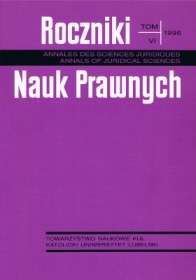Spór wokół ratyfikacji konkordatu
Abstrakt
In the beginning the author poses the following issue: why the Concordat signed on 28th July, 1993, between the Holy See and the Polish Republic has not been ratified, albeit more than two years have passed since then.
To answer this question the author states that on the part of the Holy See there are not obstacles to ratify the Concordat, having satisfied some necessary conditions on the Polish part. Unfortunately, there are obstacles on the Polish side. The adversaries of the ratification, who come from the post-communist milieus, have initiated an ideological dispute called "a religious cold war". They raised objections which have no objective foundation in the Concordat.
Despite the fact that the then president, Lech Wałęsa, was in favour of the ratification of the Concordat, he could not enforce as there was no statutory agreement from the Sejm. In order to curb the process of ratification the Sejm of the Polish Republic made a resolution on 1st July, 1994, on "the course of works on the law of the ratification of the Concordat", by virtue of which it set up an Extraordinary Committee and entrusted it with a twofold task: 1) to evaluate the legal effects for the Polish law should the ratification law be passed; 2) to evaluate the conformity between the Concordat and the draft of the Constitution which will be passed by the National Assembly.
The Extraordinary Committee stated that in order to adjust Polish legislation to the Concordat some passages of a couple of laws should be amended. The government of prime minister J.Oleksy, formed by the post-communist coalition, has prepared no projects of this amendment, and calls for a renegotiation of the Concordat. The Holy See sees no need for such a renegotiation.
Now the second tasks cannot be fulfilled by the Committee before the passing of the bill of the Constitution. It lays a sort of "trap", intended to make the Polish Episcopate accept the bill of the Constitution without any reservations.
Copyright (c) 1996 Roczniki Nauk Prawnych

Utwór dostępny jest na licencji Creative Commons Uznanie autorstwa – Użycie niekomercyjne – Bez utworów zależnych 4.0 Międzynarodowe.


